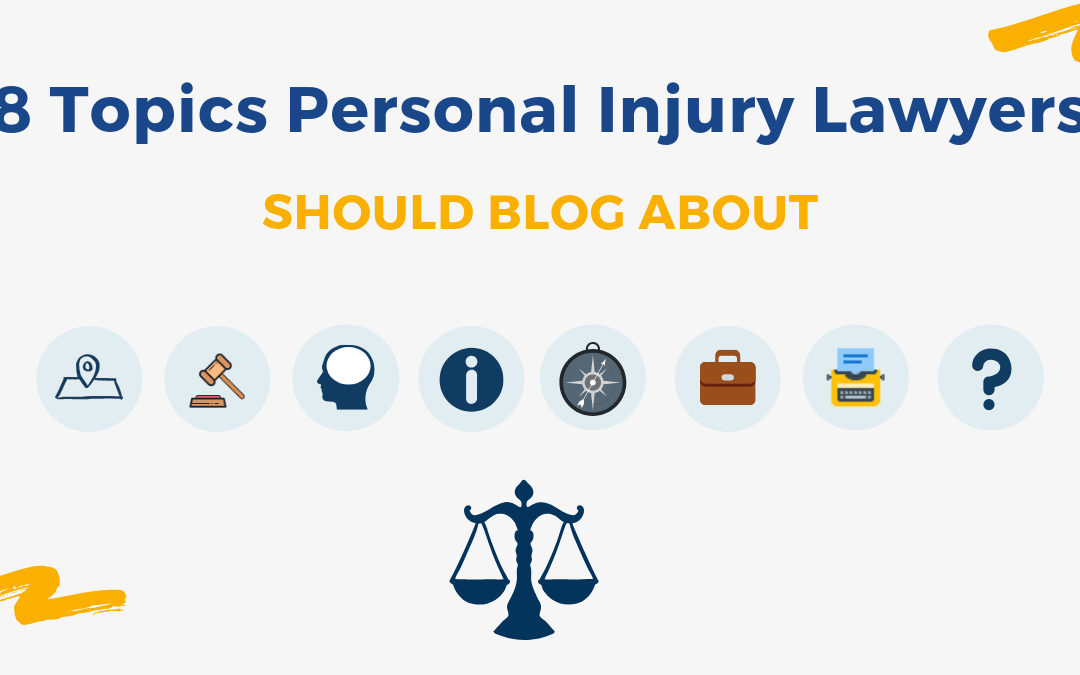Blogging is a critical component of a law firm’s SEO strategy in today’s marketplace. In fact, it should be considered more important than the typical SEO stuff that other marketers and agencies are selling you on.
Why?
Law firms are paying thousands if not tens of thousands of dollars per month to rank for keywords like ‘personal injury lawyer chicago’ or, whatever their target city and market is. While people are searching for this and similar search terms in Google, it’s over-saturated in terms of direct ROI and every big firm in town is competing for that limited real estate on the search results page.
Instead of competing head to head for overly competitive terms, you should look to provide your clients with value in the other searches they perform on Google before hiring a lawyer.
In the case of personal injury lawyers, think about what your clients are searching for after being injured or denied a claim. Those are the results you should be appearing in and, it is far less competitive since your blog is answering a specific question.
While there are many different topics and specific blogs you could write for your target audience, we’ll go over 8 topics here that will kickstart you in the right direction. By the end of writing one or two articles for each topic, as an injury lawyer, you should have a much clearer idea of new articles you can write for your specific audience (and fly under your competition’s radar).
1. Insurance Laws Specific to Your State
Lawyers are in a unique position compared to other types of local businesses. In that, the law is applied at the municipal, state, federal and international levels. As a result, people who are searching for laws are going to type in geography modifiers, like the state or city they live or work in. What happens in Florida for workers’ compensation may be similar, but most likely different in the state of Illinois for instance. Therefore, people are going to be searching on Google and Bing for information at the location-specific level.
Do a Google search for some keywords in your industry and state. You’ll see exactly how this is applied in practice.
The first result is a Workers Compensation Law Blog, specifically for Illinois. Looking at the right sidebar contact form (or even the footer) and it’s obvious that this is a marketing asset owned by an injury lawyer.
Depending on the types of injury cases you handle and where you practice law, you’ll be perfectly positioned to write articles specific to your target clients and audience.
2. Changes to Laws that Affect Future Claimants
The law of torts is a very interesting and vibrant area of the law. It’s constantly changing. This gives you another blogging opportunity for your injury legal practice. The law is always changing. As a result, there will always be something new to blog about – even if it’s just a simple update. As changes are applied to state or federal-level insurance acts, this may provide your firm with an edge to be among the first to write about the change.
An example of a simple update may be annual updates to laws or claims regarding small or minor claim amounts. The year the law is set, it may state how much a small claim maximum is set to or a capped amount. However, this may increase annually based on inflation using a consumer price index or otherwise. Write a blog article on your site and update it annually with the new amount for the year. Add any relevant updates to the law that changes as well.
3. Reasons Why People Should Use a Personal Injury Lawyer
One blog topic that I see written about over and over again, is this one. These articles almost always have identical titles. While I don’t advocate writing the boilerplate article exactly, use this to create a spin-off for more specific topics, such as:
- Do You need a lawyer for Workers Compensation Claim in California?
- Why You Shouldn’t Talk to an Insurance Adjuster without an Injury Lawyer
- What are the benefits of hiring a lawyer for an insurance claim?
Each of these would make its own article. Furthermore, I would wager, that you as an attorney, could list off answers and how you’d approach writing these articles almost immediately.
4. Legal Guides & Informational for Employees, Motorists and Cyclists
It’s understandable that many lawyers carry concern over the content that they publish on their websites and blogs. It has to be accurate and it should never constitute or be construed as legal advice.
With that said, writing guides and informational posts is critical to your injury firm’s blogging success. Some example topics you could write about include:
- Which Parties can be held liable for a car accident
- Whiplash Injury Compensation
- Long-Haul Truckers are at higher risk of MVAs
- 4 Common Causes of Motorcycle Accidents From an Open Car Door
5. Write How-to Guides about Settlement and Claims Processes
Looking back at the example of the Workers’ compensation law blog in Illinois, the title of the post was around how the settlement process works.
While each case will have its unique circumstances and variables wrapped up in the accident that caused the injuries, this shouldn’t affect your ability to write a comprehensive article discussing the boilerplate procedures. In fact, the intricacies and variables can help to lengthen your article and provide your injury victims reading your article with insights into the nuances of injury compensation cases. This can help convince a reader they need a lawyer.
Your How-to guides should be long enough to provide a bird’s eye view of the process, like a road map. These guides will be among your longest posts on your firm’s blog. The final word count could end up in the neighbourhood of 2000-3000 words. That’s more than fine. Break up long articles like this with generous amounts bolded text and subheadings. This will allow readers to quickly scan the article for the parts they want to read first.
Depending on how long your article is, will determine if you want to answer more of the intricacies in-depth or briefly discuss them and provide detailed information in a related article on your blog.
6. Review Successful Cases Your Firm has Practiced
Reviewing large and noteworthy cases are great for your firm’s image from many angles.
This can build credibility to site visitors and offers an easy selling point for anyone considering hiring an injury or accident lawyer. These can be featured on your homepage. Thaw way anyone who landed on your website may spot it quickly and be encouraged by the results to hire your firm.
Noteworthy cases may be those that will impact future cases by means of precedence. Other times, noteworthy are cases those that were tried and won at the Supreme Court. These are great for your firm’s reputation as it has a better chance of being picked up by the media. Having a post on your firm’s website offers journalists and media outlets a source for the story or anything they may want to quote can be cited and linked back to. This can be very powerful for link building and SEO.
While this type of article is less likely to generate as much qualified traffic in terms of leads and clients from search engines like Bing and Google. As mentioned above, they do have their place and can still be very valuable after visitors have found your site through a different channel or search query.
7. Turn Your Clients’ Common Questions into In-Depth Response Articles
These can be some of your most valuable posts on your law firm’s blog. It’s actually already been discussed, in part, in How-to guides as well as other topics you can write about. In order to understand how this works, start by thinking of your clients just like a consumer in any other industry. Before making a sizable purchase, be it a computer or a new appliance, their likely to do research on the state of the market. What features are available, what is the reliability, the drawbacks. You yourself have likely done this many times before – as a savvy consumer yourself.
Hundreds or thousands of potential clients are searching for these topics in your firm’s area – every month.
- How settlements work
- what are they entitled to
- what are the different types of WAD (Whiplash Associated Disorders) and how does that impact their claim
Regardless of whether your firm writes blogs about this or your competitors do, your potential clients are searching for answers to their questions. Fortunately, they’re likely to search for multiple questions related to their case. The more queries and questions you answer for them, the more touch points and impressions you make on them, before they call to hire a lawyer.
8. Blog about Specifics Regarding Liabilities in Different Types of Cases
In personal injury and insurance claim cases, there are many questions searched by injury and at-fault parties on the subject of liability. This can create a series of articles that stem across a variety of different case types, including dog bites, product liability, malpractice, premises liability, motor vehicle accidents and more. Like with many articles you’ll write, there is never a one-size fits all solution. Again, you’re job is simply to answer their query as clearly as possible and better than any other website that Google can find for that search result. You’re not giving legal advice, simply supplying them with information.
Conclusion
Many law firms blogs that I look at are boring or write about the same old FAQs that everyone else does. Things like what to do after a car accident, etc. Ultimately, lawyers that are successful with their blogging and content marketing approach their writing from delivering satisfactory responses and information to their audience’s questions. Because the tort law is so malleable and it changes state to state as well as from case to case, it’s easy to come up with a list of unique blog articles in contrast to your competitors. Individually, these articles won’t generate a lot of traffic, but collectively could be a game changer for your injury practice’s growth.


